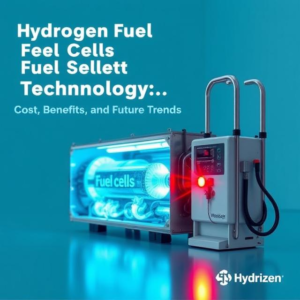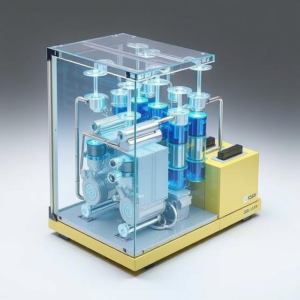Hydrogen Fuel Cell Technology: Cost, Benefits, and Future Trends
Introduction to Hydrogen Fuel Cell Technology
Hydrogen fuel cell technology is emerging as a promising solution for clean energy and sustainable transportation. Unlike conventional internal combustion engine vehicles, hydrogen fuel cell vehicles (FCVs) generate power through a chemical reaction between hydrogen and oxygen, producing only water vapor as emissions. This makes them a significant player in the future of renewable and sustainable energy solutions.

How Hydrogen Fuel Cell Systems Work
A hydrogen fuel cell system consists of several components, including fuel cells, a hydrogen tank, and an electric motor. The working principle involves:
- Hydrogen Production: Hydrogen is extracted from water through electrolysis or from natural gas via steam reforming.
- Energy Generation: The fuel cell combines hydrogen with oxygen from the air, producing electricity, heat, and water as byproducts.
- Power Transmission: The generated electricity powers the car’s electric motor, providing propulsion.
Cost and Price of Hydrogen Fuel Cell Cars
One of the major challenges in the hydrogen fuel cell market is cost. The price of hydrogen fuel cell vehicles remains higher than conventional gasoline and electric cars due to:
- High production costs of fuel cells and hydrogen storage systems.
- Limited infrastructure for hydrogen refueling stations.
- Expensive hydrogen production and distribution processes.
However, with advancements in technology and increased market demand, prices are expected to decrease, making hydrogen-powered vehicles more accessible.
Advantages of Hydrogen Fuel Cell Vehicles

Hydrogen fuel cell cars offer several benefits over traditional and electric vehicles, including:
- Zero Emissions: The only byproduct is water, making them environmentally friendly.
- Higher Efficiency: Fuel cell technology provides greater energy efficiency compared to internal combustion engines.
- Fast Refueling: Unlike electric vehicles (EVs) that require hours to recharge, FCVs can be refueled in minutes.
- Longer Range: Hydrogen-powered vehicles often have a greater driving range compared to battery-electric cars.
Disadvantages and Challenges
Despite their benefits, hydrogen fuel cell vehicles face several challenges:
- High Production and Infrastructure Costs: Setting up hydrogen refueling stations is expensive.
- Limited Availability: Hydrogen fueling stations are scarce, limiting the widespread adoption of FCVs.
- Hydrogen Storage Issues: Storing and transporting hydrogen efficiently remains a technological hurdle.
- Comparison with Electric Vehicles: Battery-powered electric vehicles are currently more widespread and have better charging infrastructure.
Market Trends and Future of Hydrogen Fuel Cells
The global market for hydrogen fuel cell technology is rapidly evolving. Governments and automakers are investing in hydrogen as a key component of clean transportation. Some major trends include:
- Expansion of Hydrogen Refueling Infrastructure: Countries like Japan, Germany, and the US are increasing hydrogen station networks.
- Advancements in Fuel Cell Efficiency: Research is focused on improving hydrogen production and fuel cell efficiency.
- Rise in Sustainable Energy Applications: Hydrogen is being explored for industrial applications beyond transportation, including power generation and heating.
- Comparisons with Electric Vehicles: While electric cars dominate the market, hydrogen fuel cells are gaining attention for their advantages in commercial transportation and heavy-duty vehicles.
Conclusion
Hydrogen fuel cell technology presents an exciting future for clean energy and sustainable transportation. While there are challenges related to cost, infrastructure, and efficiency, ongoing advancements and government support are paving the way for wider adoption. As the market evolves, hydrogen-powered vehicles could become a key player in achieving a zero-emission future.